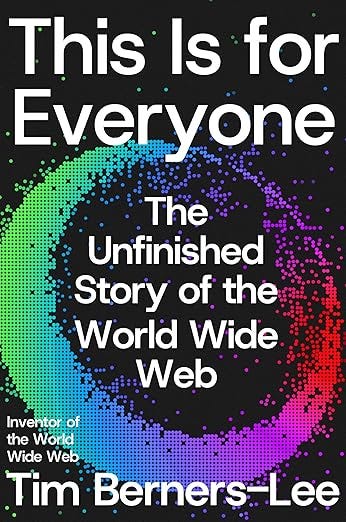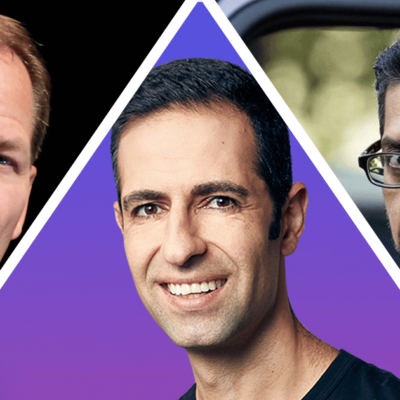
AI: Internet Guru Tim Berners-Lee's notable new book. RTZ #852
I’ve had a life-long fascination with always undersnanding how everything gets built on the work of others before, aka ‘On the Shoulders of Giants’ (aka OTSOG). A phrase made famous by Isaac Newton. And I have written extensively about how the Internet over the last 25+ years, and now the AI Tech Wave over at least the next 25, will accelerate the building on the works of ‘Giants and Grunts’ as I put it two years ago.
So when one of those giants, and one of the key inventors of the internet as we know it, Tim Berners-Lee is publishing a new book in memoir/manifesto form, it’s worth a discussion.
The FT has a great write up on it all in “This is for Everyone — Tim Berners-Lee’s manifesto for a better online world”:
“The World Wide Web inventor criticises the ‘rage bait’ of algorithms and social media — and advocates tighter user control of personal data”.
”The world wide web is one of the most astonishing inventions in human history, and Sir Tim Berners-Lee is justifiably proud of his creation. Now used by 5.5bn people, the web has become an indispensable technology for global connectivity and creativity that has been seamlessly woven into our lives. It is hard to imagine how we would function without access to more than 1bn websites, search engines, ecommerce, social networks, podcasts and — Berners-Lee’s favourite online resource — Wikipedia.”
“Whatever his accomplishments, the British inventor is also acutely anxious about the social ills that have mushroomed online — most notably the erosion of institutional trust, political polarisation and the mental health crisis afflicting the young. To his credit, the 70-year-old Berners-Lee is still fighting to preserve the web’s original promise, which, he argues, has been despoiled by malign users, rapacious corporations and authoritarian governments.”
“Part memoir, part manifesto, Berners-Lee’s chirpy book This Is For Everyone is both an engaging history of the origins and evolution of the web and an ingenious road map for how we can reclaim control over our digital lives. His big idea, which has now become his latest personal obsession, is to restore data sovereignty to every individual by redesigning the web. To that end, he has launched a new protocol and founded a start-up to help return ownership of data to users.”
“The first part of his book canters through his upbringing and early career with wry humour. Born in 1955, the same year as Bill Gates and Steve Jobs, he was brought up in an intensely intellectual and fun-loving family in Sheen, south-west London. Both his parents were mathematicians and electrical engineers, who met when working on Britain’s first commercial computer, the Ferranti Mark 1, and knew Alan Turing. Berners-Lee acknowledges that he was lucky to be born into a generation that experienced a “magic carpet ride” through the early computer revolution.”
The whole piece is worth reading, but I’ll skip ahead to his thoughts on where AI is heading being built on top of the Internet to date. And he’s thinking and writing about the core ingredient that drives AI in all its form, DATA, a topic I’ve covered in depth here at AI: RTZ. It’s the critical and differentiated Box no. 4 in my AI Tech Stack chart below.
“Berners-Lee also condemns social media platforms such as Facebook, X (formerly Twitter) and TikTok that surveil their users and optimise for engagement rather than enjoyment. The increasing use of AI has only boosted nastier content — or “rage bait” — that keeps users swiping. The author has no doubt that the ability of platforms to “narrowcast” personalised messages to susceptible voters was a big factor in Britain’s Brexit vote and Donald Trump’s election to the US presidency in 2016.”
“You didn’t have to be a political scientist to understand the damage that provocative, targeted, secret and highly individualized propaganda could do to democratic discourse. I compare it, today, to an undercover megaphone,” he writes.”
Here’s a brief video explaining the core elements of Solid.
“His dismay at how internet users have been tracked, targeted and manipulated provoked him into launching a new venture as a response. With researchers at MIT, he has developed a protocol, called Solid, to invert the data architecture of the web. By storing all their personal information in their own data wallet, users should themselves be able to make their own connections and share data with trusted parties. In doing so, it will move our online world from an attention to an intention economy, he argues.”
I’ve been following Solid for some time now, and it remains a valiant effort in its early days.
And I’m excited to read the book, through all the history we’ve lived through to date. And of course the lessons on how we might want to tweak things for the AI Tech Wave ahead.
And continue to build on top of the shoulders of giants and grunts. Stay tuned.
(NOTE: The discussions here are for information purposes only, and not meant as investment advice at any time. Thanks for joining us here)











